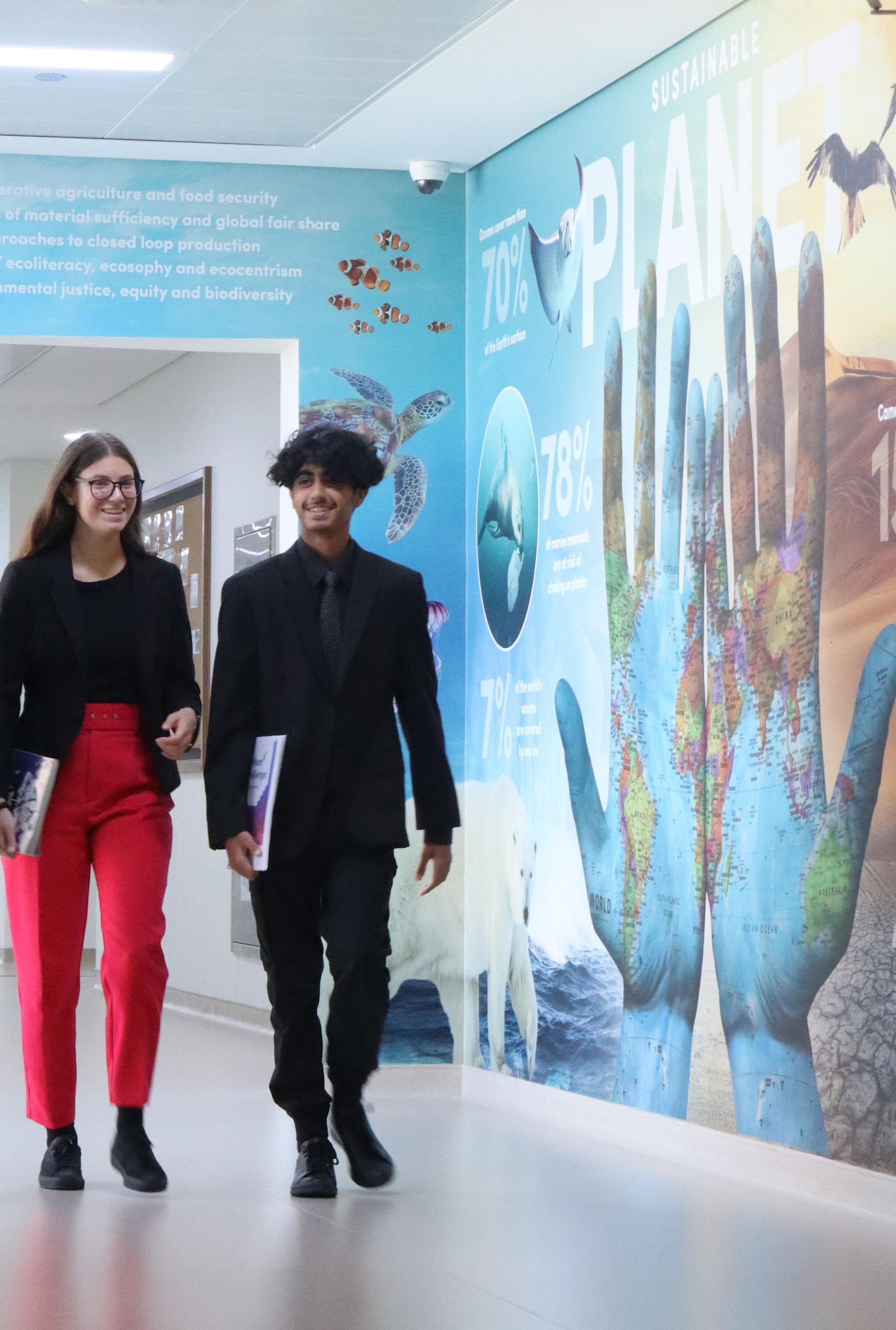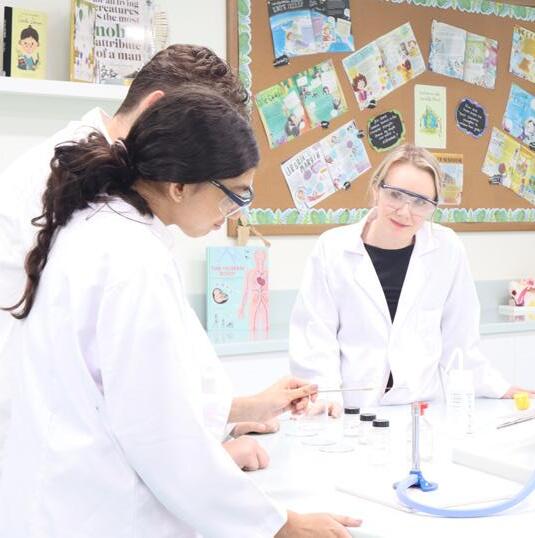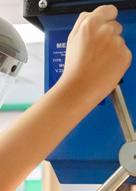The details
TIMES OF DAY
The Sixth Form will work on an adapted timetable depending on each student’s course selections. Supported by research, but as any parent of teenagers will know, the biorhythms and sleep patterns of a teenager mean they are least alert and ready to learn early in the morning. Arbor have taken a research- informed approach to the development of the school day for teenage students.
UNIFORM
We provide a useful stepping stone for students as they move from Secondary students into Sixth Formers, and leave us to head to University. As such our uniform features formal office style wear on a Monday for formal assembly, an Arbor Sixth Form polo shirt with smart trousers/skirts Tuesday to Thursday and House tops on Friday. Sports students have an option of wearing their Sixth Form tracksuit on their sport timetabled days.
Scholarships
IGNITE SCHOLARSHIP
The culture of ambition which exists in the Arbor School supports the idea of recognising, rewarding and retaining excellence in all forms. The Arbor School’s Ignite Scholars programme is an avenue to pursue and embed this culture whereby students demonstrating excellence may be recruited, rewarded, and retained through a scholarship programme.
A scholarship provides a reduction in fees. Scholarships are for fixed periods of time (usually 2 years in duration).
SCHOLARSHIP CRITERIA
Scholarships will be awarded to students demonstrating the potential to achieve to the highest levels. Selected candidates will demonstrate outstanding prior achievement or academic capacity in one or more subject areas, and are expected to meet most or all the following criteria:
Stanine 9 in the GL CAT4 assessment in at least 3 of the 4 batteries
Stanine 9 in more than one of the English, Math and Science GL Progress Tests
DEVICES
All students will have a surface pro with stylus allowing the to use the school Microsoft Team platforms, and also be creative and precise by drawing, annotating and make specific selections.
Students are encouraged to organise their time using their online schedule and timetable planner.
Equivalent levels of attainment in other, recognised standardised assessments
GCSE Results
Additional demonstrable levels of excellence may be taken into consideration, including excellence in sports, arts or culture; however academic achievement is the deciding factor when considering applicants for the Arbor Scholarship Programme.
For more details and to apply, please visit www.thearborschool.ae/ admissions/scholarships
ART & DESIGN
Examination Board Pearson Edexcel Level 3 Advanced GCE in Art and Design
Specification Art, Craft and Design (9AD0), Fine Art (9FA0)
What does this subject involve?
How is the course assessed?
The course aims to develop students’ intellectual, creative, and practical skills while fostering independence and a deep appreciation for art, craft, and design. Students gain hands-on experience with diverse media, learn about the interconnectedness of artistic processes, and explore real-world applications, including potential links to creative industries, within historical and contemporary contexts. The curriculum also imparts knowledge of art, craft, design, and media in various societies and cultures and promotes awareness of the diverse roles and audiences within these fields.
The Pearson Edexcel Level 3 Advanced GCE in Art and Design consists of two components, both teacher assessed and externally moderated by us.
Component 1
Portfolio of development work and outcomes based on themes and ideas developed from personal starting points.
90 marks per paper
60% of the qualification
Possible Career Pathways
Component 2
Preparatory studies and the 15–hour period of sustained focus.
40% of the qualification
40% of the qualification
The Art & Design curriculum tailors itself as the foundation of understanding and therefore offers opportunities into a wide range of career pathways in the creative and artistic industries. Graduates can embark on paths as visual artists, graphic designers, fashion designers, or interior designers, creating and shaping the visual world around us. The course prepares students for a wide spectrum of professions, from architects to photographers, and from creative directors to art historians, allowing them to follow their artistic passions and contribute to various industries and sectors, including culture, design, and media.
Prerequisites Must have studied GCSE Art achieving a grade 6 or above or be able to show a portfolio of highly skilled artworks.
DESIGN & TECHNOLOGY
Examination Board Pearson Edexcel Level 3 Advanced GCE in Art and Design
Specification Art, Craft and Design (9AD0), Fine Art (9FA0)
What does this subject involve?
How is the course assessed?
The course aims to develop students’ intellectual, creative, and practical skills while fostering independence and a deep appreciation for art, craft, and design. Students gain hands-on experience with diverse media, learn about the interconnectedness of artistic processes, and explore real-world applications, including potential links to creative industries, within historical and contemporary contexts. The curriculum also imparts knowledge of art, craft, design, and media in various societies and cultures and promotes awareness of the diverse roles and audiences within these fields.
The Pearson Edexcel Level 3 Advanced GCE in Design and Technology (Product Design) consists of one externally examined paper and one non-examined assessment component.
Component 1
Component 2
Principles of Design and Technology Independent Design and Make Project
Written examination: 2 hours 30 minutes
120 marks per paper
50% of the qualification
Possible Career Pathways
Prerequisites
Non-examined assessment
120 marks per paper
50% of the qualification
Studying this course offers a multitude of potential career pathways. Graduates can pursue roles as product designers, industrial designers, architects, or mechanical engineers, where they create innovative products, systems, or buildings. Alternatively, they may delve into fields like materials science, sustainability consulting, focusing on sustainable practices and user-centric design. Whether specialising in prototype development, graphic design, or engineering, this course equips students with the skills and knowledge to embark on diverse and rewarding career journeys in design and technology.
Must have studied GCSE Design Technology achieving a grade 6 or above or be able to show a portfolio of highly skilled design work and innovation interests.
CHEMISTRY
Examination Board Pearson Edexcel International Advanced Subsidiary & International Advanced Level in Chemistry
Specification (XCH11), (YCH11)
What does this subject involve?
How is the course assessed?
The aims and objectives of this chemistry course are to provide students with fundamental knowledge of various chemistry disciplines and how they interconnect. It also seeks to instil a profound appreciation for scientific methods and competence in practical, mathematical, and problem-solving skills. Furthermore, the course aims to cultivate students’ interest and enthusiasm for chemistry, fostering a desire for further study and future careers in the field.
The International Advanced Level consists of the three IAS units (units 1, 2 and 3) plus three IA2 units (units 4, 5 and 6). Candidates wishing to take the International Advanced Level must, therefore, complete all six units.
Unit 1 Unit 2 Unit 3
Structure, Bonding and Introduction to Organic Chemistry Energetics, Group Chemistry, Halogenoalkanes and Alcohols
Written examination: 1 hour and 30 minutes
Written examination: 1 hour and 30 minutes
Practical Skills in Chemistry I
Written examination: 1 hour and 20 minutes
80 marks per paper 80 marks per paper 50 marks per paper
40% of the total IAS
20% of the total IAL
Unit 4
Rates, Equilibria and Further Organic Chemistry
Written examination: 1 hour and 45 minutes
40% of the total IAS 20% of the total IAL
Unit 5
Transition Metals and Organic Nitrogen Chemistry
Written examination: 1 hour and 45 minutes
20% of the total IAS
10% of the total IAL
Unit 6
Practical Skills in Chemistry II
Written examination: 1 hour and 20 minutes
90 marks per paper 90 marks per paper 50 marks per paper
40% of the total IAS
20% of the total IAL
Possible Career Pathways
40% of the total IAS
20% of the total IAL
20% of the total IAS
10% of the total IAL
The chemistry curriculum presents a wide range of career opportunities. Graduates can embark on careers as chemists, specializing in various fields like organic, inorganic, analytical, or physical chemistry, conducting vital research and experiments. Others may choose to become chemical engineers, designing processes for chemical production, or pharmaceutical scientists, developing medications. Additionally, chemistry leads to roles in quality control, chemical sales, safety, and education, providing a wide range of professional paths.
Prerequisites Must have successfully achieved a grade 6 or above at GCSE Chemistry or equivalent as well as achieving 5s or above in both English and Mathematics.
BIOLOGY
Examination Board Pearson Edexcel International Advanced Subsidiary & International Advanced Level in Biology
Specification (XBI11), (YBI11)
What does this subject involve?
How is the course assessed?
The aims and objectives of this biology course are to provide students with fundamental knowledge of various biology disciplines and how they interconnect. It also seeks to instil a profound appreciation for scientific methods and competence in practical, mathematical, and problem-solving skills. Furthermore, the course aims to cultivate students’ interest and enthusiasm for biology, fostering a desire for further study and future careers in the field.
The International Advanced Level consists of the three IAS units (units 1, 2 and 3) plus three IA2 units (units 4, 5 and 6). Candidates wishing to take the International Advanced Level must, therefore, complete all six units.
Unit 1 Unit 2 Unit 3
Molecules, Diet, Transport and Health
Written examination: 1 hour and 30 minutes
Cells, Development, Biodiversity and Conservation Make Project
Written examination: 1 hour and 30 minutes
Practical Skills in Biology I
Written examination: 1 hour and 20 minutes
80 marks per paper 80 marks per paper 50 marks per paper
40% of the total IAS
20% of the total IAL
Unit 4
Energy, Environment, Microbiology and Immunity
Written examination: 1 hour and 45 minutes
40% of the total IAS 20% of the total IAL
Unit 5
Respiration, Internal Environment, Coordination and Gene Technology
Written examination: 1 hour and 45 minutes
20% of the total IAS 10% of the total IAL
Unit 6
Practical Skills in Biology II
Written examination: 1 hour and 20 minutes
90 marks per paper 90 marks per paper 50 marks per paper
40% of the total IAS
20% of the total IAL
Possible Career Pathways
40% of the total IAS
20% of the total IAL
20% of the total IAS
10% of the total IAL
The biology curriculum presents a wide range of career opportunities. Graduates can become biologists, delving into areas such as microbiology, genetics, ecology, or cell biology. Others may pursue careers in medicine, pharmacy, or biomedical science. Some opt for roles as genetic counsellors, pharmacologists while environmental science offers paths as ecologists, environmental scientists, or wildlife biologists. The field encompasses a vast array of options, including marine biology, botany, forensic science, and nutrition, making it an exciting and versatile choice.
Prerequisites Must have successfully achieved a grade 6 or above at GCSE Biology or equivalent as well as achieving 5s or above in both English and Mathematics.
PHYSICS
Examination Board Pearson Edexcel International Advanced Subsidiary & International Advanced Level in Physics
Specification (XPH11), (YPH11)
What does this subject involve?
How is the course assessed?
The aims and objectives of this physics course are to provide students with fundamental knowledge of various physics disciplines and how they interconnect. It also seeks to instil a profound appreciation for scientific methods and competence in practical, mathematical, and problem-solving skills. Furthermore, the course aims to cultivate students’ interest and enthusiasm for physics, fostering a desire for further study and future careers in the field.
The International Advanced Level consists of the three IAS units (units 1, 2 and 3) plus three IA2 units (units 4, 5 and 6). Candidates wishing to take the International Advanced Level must, therefore, complete all six units.
Unit 1
Unit 2
Mechanics and Materials Waves and Electricity
Written examination: 1 hour and 30 minutes
Written examination: 1 hour and 30 minutes
Unit 3
Practical Skills in Physics I
Written examination: 1 hour and 20 minutes
80 marks per paper 80 marks per paper 50 marks per paper
40% of the total IAS
20% of the total IAL
Unit 4
Further Mechanics, Fields and Particles
Written examination: 1 hour and 45 minutes
40% of the total IAS 20% of the total IAL
Unit 5
Thermodynamics, Radiation, Oscillations and Cosmology
Written examination: 1 hour and 45 minutes
20% of the total IAS 10% of the total IAL
Unit 6
Practical Skills in Physics II
Written examination: 1 hour and 20 minutes
90 marks per paper 90 marks per paper 50 marks per paper
40% of the total IAS
20% of the total IAL
Possible Career Pathways
40% of the total IAS 20% of the total IAL
20% of the total IAS 10% of the total IAL
The physics curriculum presents a wide range of career opportunities. Graduates can delve into the realm of research as physicists, specializing in areas such as particle physics, astrophysics, or quantum mechanics, pushing the boundaries of scientific understanding. Others may choose engineering, applying physics principles to design aerospace systems, electrical circuits, or mechanical devices. Additionally, physics opens doors to careers in finance, robotics, space science, and environmental consultancy, while entrepreneurial ventures in physics-related industries are also viable options.
Prerequisites Must have successfully achieved a grade 6 or above at GCSE Physics or equivalent as well as achieving 5s or above in both English and Mathematics.
GEOGRAPHY
Examination Board Pearson Edexcel International Advanced Subsidiary & International Advanced Level in Geography
Specification (XGE01), (YGE01)
What does this subject involve?
How is the course assessed?
The course aims to develop students’ comprehensive knowledge of geographical concepts and contexts, from local to global scales. It focuses on in-depth understanding of physical and human geography patterns and issues, emphasizing the complexity of people-environment interactions. Students learn to apply key concepts like place, space, scale, and environment, while also considering the influence of values, attitudes, and circumstances on these relationships. The course equips students with quantitative and qualitative skills, emphasizes the importance of fieldwork, and encourages the rigorous application of geographical knowledge to real-world questions and issues.
The International Advanced Level consists of the two IAS units (Units 1 and 2) plus two IA2 units (Units 3 and 4). Students wishing to take the International Advanced Level must, therefore, complete all four units.
Unit 1
Global Challenges
Written examination: 1 hour and 45 minutes
90 marks per paper
60% of the total IAS
30% of the total IAL
Unit 3
Contested Planet
Written examination: 2 hours
90 marks per paper
60% of the total IA2
30% of the total IAL
Possible Career Pathways
Unit 2
Geographical Investigations
Written examination: 1 hour and 30 minutes
60 marks per paper
40% of the total IAS
20% of the total IAL
Unit 4
Researching Geography
Written examination: 1 hour and 30 minutes
60 marks per paper
40% of the total IA2
20% of the total IAL
This geography course opens diverse career pathways. It provides students with a holistic understanding of geographical concepts, including physical and human geography at various scales. Graduates can pursue roles as geographers, environmental consultants, or urban planners, conducting research and analysis. Opportunities also extend to climate analysis, international development, education, journalism, and market research, with applications in government, NGOs, and private industries. The versatility of geography equips individuals to address complex global challenges.
Prerequisites Must have successfully achieved a grade 6 or above at GCSE Geography as well as achieving 5s or above in both English and Mathematics.
HISTORY
Examination Board Pearson Edexcel International Advanced Subsidiary & International Advanced Level in History
Specification (XHI01), (YHI01)
What does this subject involve?
How is the course assessed?
The course aims to spark students’ interest in history, promote an understanding of societal diversity, offer a balanced study of the past, and cultivate critical thinking skills. It emphasizes research abilities, historical judgment’s provisional nature, and proficiency in historical concepts. The course also encourages students to make connections across different historical periods and effectively communicate their historical knowledge and arguments.
The International Advanced Level consists of the two IAS units (Unit 1 and 2) and two IA2 units (Unit 3 and 4). Students wishing to take the International Advanced Level must, therefore, complete all four units.
Unit 1
Depth Study with Interpretations
Written examination: 2 hours
50 marks per paper
50% of the total IAS
25% of the total IAL
Unit 3
Thematic Study with Source Evaluation
Written examination: 2 hours
50 marks per paper
50% of the total IA2
25% of the total IAL
Possible Career Pathways
Unit 2
Breadth Study with Source Evaluation
Written examination: 2 hours
50 marks per paper
50% of the total IAS
25% of the total IAL
Unit 4
International Study with Historical Interpretations
Written examination: 2 hours
50 marks per paper
50% of the total IA2
25% of the total IAL
This history course opens up numerous potential career pathways for graduates. It aims to ignite students’ interest in history while fostering an understanding of societal diversity, offering a well-rounded study of the past, and nurturing critical thinking skills. Graduates can pursue careers as historians, archivists, educators, researchers, journalists, curators, and more. The versatile skills developed in this course enable individuals to contribute to fields such as education, research, media, cultural heritage preservation, and public engagement, making history an invaluable foundation for diverse career opportunities.
Prerequisites Must have successfully achieved a grade 6 or above at GCSE History as well as achieving 5s or above in both English and Mathematics.
ENVIRONMENTAL MANAGEMENT
Examination Board Cambridge International Advanced Subsidiary Level Environmental Management
Specification (8291)
What does this subject involve?
The aims are to enable students to develop:
• Knowledge of natural systems which make life possible on earth
• An understanding that humans are part of these systems and depend on them
• An appreciation of the diverse influences of human activity on natural systems
• An awareness of the need to manage natural systems
• An understanding of sustainable development to meet the needs of the present, without compromising the ability of future generations to meet their own needs
• A sense of responsibility and concern for the welfare of the environment and all organisms
• An awareness of their own values concerning environmental issues
• An awareness of the values of others
• A willingness to review their own attitudes in the light of new knowledge and experiences
• A sound basis for further study, personal development and participation in local and global environmental concerns.
How is the course assessed?
The International AS Level consists of two components below:
Component 1
Component 2
Principles of Environmental Management Management in Context 1
Section A: between four and six structured questions, with a range of task types. (60 marks)
Section B: one essay from a choice of two questions. (20 marks)
Total: 80 marks
Externally assessed
50% of the AS Level
Possible Career Pathways
Between four and six structured questions, with a range of task types.
Total: 80 marks
Externally assessed
50% of the AS Level
Cambridge International AS Level Environmental Management provides knowledge and transferable skills that support further subject specific study. Depending on local university entrance requirements, students may be able to use it to progress directly to university courses in Environmental Management or related subjects. Graduates can pursue careers in journalism, international relations, policy analysis, development work, law, academia, advocacy, and various other fields where understanding and navigating global perspectives is crucial.
Prerequisites Must have successfully achieved a grade 6 or above at GCSE Environmental Management or suitably equivalent qualification as well as achieving 5s or above in both English and Mathematics.
GLOBAL PERSPECTIVES & RESEARCH
Examination Board Cambridge International Advanced Subsidiary & International Advanced Level Global Perspectives & Research
Specification (9239)
What does this subject involve?
How is the course assessed?
The aims and objectives of this course are to foster an acknowledgment and understanding of diverse perspectives on global issues. It aims to develop students’ critical thinking abilities, enabling them to evaluate claims and evidence, make independent judgments supported by reasoning and evidence, and emphasize the importance of justifying their opinions. The course also aims to cultivate effective research skills, guiding students in using appropriate sources to support their judgments and understand research processes. Additionally, it encourages self-reflection on learning, judgments, and collaborative work while promoting the development of strong written and spoken communication skills.
The International Advanced Level consists of the three IAS components (Component 1, 2 and 3) and one IA2 units (Component 4). Students wishing to take the International Advanced Level must, therefore, complete all four units.
Component 1
Written examination: 1 hour 30 minutes
45 marks per paper
36% of the total IAS 18% of the total IAL
Component 3
Non-Examination Assessment - Team Project
40 marks per paper
32% of the total IAS 16% of the total IAL
Possible Career Pathways
Component 2
Non-Examination Assessment - Essay
40 marks per paper
32% of the total IAS 16% of the total IAL
Component 4
Cambridge Research Report
85 marks per paper
- Research report (75 marks)
- Research log (10 marks)
50% of the total IAL
This course aims to prepare students for diverse careers by fostering an understanding of global perspectives and critical thinking skills. It encourages acknowledgment of diverse viewpoints on global issues, development of the ability to evaluate evidence, and making independent, well-reasoned judgments. Graduates can pursue careers in journalism, international relations, policy analysis, development work, law, academia, advocacy, and various other fields where understanding and navigating global perspectives is crucial.
Prerequisites Must have successfully achieved a grade 6 or above at GCSE Global Perspectives or suitably equivalent qualification as well as achieving 5s or above in both English and Mathematics.
ENGLISH LANGUAGE
Examination Board Oxford AQA International Advanced Subsidiary & International Advanced Level English Language
Specification (9670)
What does this subject involve?
How is the course assessed?
The aims and objectives of this course are to nurture students’ creative and critical skills in both producing and analysing texts. It seeks to deepen their comprehension of how language varies in different contexts and among diverse social groups. Additionally, the course aims to enhance students’ knowledge of language acquisition and the emergence of new forms of English on a global scale. Furthermore, it encourages students to explore data using valuable academic research skills, which are highly regarded by universities and applicable across various academic and professional domains.
The International Advanced Level consists of the two IAS units (Unit 1 and 2) and two IA2 units (Unit 3 and 4). Students wishing to take the International Advanced Level must, therefore, complete all four units.
Unit 1
Language and context
Written exam: 2 hours
50 marks per paper
50% of the total IAS
20% of the total IAL
Unit 3
Language variation
Written exam: 2 hours
50 marks per paper
30% of the total IAL
Possible Career Pathways
Unit 2
Language and society
Written exam: 2 hours
50 marks per paper
50% of the total IAS
20% of the total IAL
Unit 4
Language exploration (a or b)
4a - Written exam: 2 hours 30 minutes
4b - Non-exam assessment - A language investigation
50 marks per paper
30% of the total IAL
This course aims to prepare students for a diverse range of career pathways by nurturing their creative and critical skills in both producing and analysing texts. It encourages a deeper understanding of how language varies across contexts and among different social groups. Graduates can pursue careers in language and communication, education, content creation, journalism, public relations, translation, research, technical communication, and various other fields that require strong language and communication competencies.
Prerequisites Must have successfully achieved a grade 7 or above at GCSE English Language or suitably equivalent qualification.
ENGLISH LITERATURE
Examination Board Oxford AQA International Advanced Subsidiary & International Advanced Level English Literature
Specification (9675)
What does this subject involve?
How is the course assessed?
The aims and objectives of this course are to cultivate students’ creative and critical skills in reading and analysing texts. It encourages them to uncover meanings within texts, fostering a deeper understanding of how interpretations of texts can differ depending on the context. Additionally, the course aims to provide students with insights into literary criticism from various theoretical perspectives, promoting a well-rounded understanding of literary analysis and interpretation.
The International Advanced Level consists of the two IAS units (Unit 1 and 2) and two IA2 units (Unit 3 and 4). Students wishing to take the International Advanced Level must, therefore, complete all four units.
Unit 1
Unit 2
Aspects of dramatic tragedy Place in literary texts
Written exam: 2 hours
Closed book
50 marks per paper
50% of the total IAS
20% of the total IAL
Unit 3
Elements of crime and mystery
Written exam: 2 hours
Study of two texts
50 marks per paper
30% of the total IAL
Possible Career Pathways
Written exam: 2 hours
Open book
50 marks per paper
50% of the total IAS
20% of the total IAL
Unit 4
Literary representations (a or b)
4a - Written exam: 2 hours 30 minutes
4b - Non-exam assessment - Study of two texts: one poetry text and one prose text.
50 marks per paper
30% of the total IAL
This course seeks to equip students with the skills to read and analyse texts creatively and critically, preparing them for diverse career opportunities. Graduates can pursue careers as writers, editors, literary critics, educators, publishing professionals, journalists, translators, and various other roles within the literary and cultural industries. Their strong analytical and creative abilities, along with their deep appreciation of literature, make them well-suited for careers that require effective communication, critical thinking, and a passion for literary exploration.
Prerequisites Must have successfully achieved a grade 7 or above at GCSE English Literature or suitably equivalent qualification.
DRAMA
Examination Board Cambridge International Advanced Subsidiary & International Advanced Level Drama
Specification (9482)
What does this subject involve?
How is the course assessed?
Cambridge International AS & A Level Drama encourages students to develop their skills in performing, devising and researching a wide range of theatrical styles and genres. They learn to communicate with an audience through practical and creative work on performance texts and their own devised material, both as individuals and in groups. Underpinned by theoretical and practical study, they learn to research, analyse, create and interpret, and to become skilled, wellinformed and reflective theatrical practitioners who enjoy drama.
The International Advanced Level consists of the two IAS components (Component 1 and 2) and two IA2 units (Component 3 and 4). Students wishing to take the International Advanced Level must, therefore, complete all four units.
Component 1
Written examination: 2 hours
60 marks per paper Open-book exam
50% of the total IAS 25% of the total IAL
Component 3
Theatre-making and performing
60 marks per paper 2x parts - Devising & Performing
25% of the total IAL
Possible Career Pathways
Component 2
Practical Drama
60 marks per paper 2x parts - Devising & Performing
50% of the total IAS 25% of the total IAL
Component 4
Theatre in context
60 marks per paper There is one part to the research coursework:
– 2500–3000-word research essay
25% of the total IAL
Studying drama at the A-level opens up diverse career pathways in the performing arts and related fields. Potential careers include acting, directing, playwriting, production roles, teaching drama, arts administration, drama therapy, media, event planning, creative writing, public speaking, and more. Further education and training are often necessary, and careers in the dramatic arts can be competitive and may involve freelance or contract work.
Prerequisites Must have successfully achieved a grade 6 or above at GCSE Drama or suitably equivalent qualification as well as achieving 5s or above in English language / literature.
FRENCH
Examination Board Pearson Edexcel International Advanced Subsidiary & International Advanced Level in French
Specification (XFR01), (YFR01)
What does this subject involve?
How is the course assessed?
The course aims to develop students’ proficiency in understanding complex texts and spoken language for diverse purposes. It emphasizes clear and wellstructured writing, fluent and spontaneous speaking, and prepares students for further study or employment in French-speaking contexts, including business and commerce. Additionally, it fosters an understanding of language in various cultural contexts to enhance communication competence.
The International Advanced Level consists of the two IAS units (Units 1 and 2) plus two IA2 units (Units 3 and 4). Students wishing to take the International Advanced Level must, therefore, complete all four units.
Unit 1
Spoken expression and response
Externally assessed spoken examination: 8-10 minutes
40 marks per paper
30% of the total IAS
15% of the total IAL
Unit 3
Understanding and spoken response
Externally assessed spoken examination: 11-13 minutes
40 marks per paper
30% of the total IA2
15% of the total IAL
Possible Career Pathways
Unit 2
Understanding and written response
Externally assessed written examination: 2 hours and 30 minutes
90 marks per paper
70% of the total IAS
35% of the total IAL
Unit 4
Research, understanding and written response
Externally assessed written examination: 2 hours and 30 minutes
90 marks per paper
70% of the total IA2
20% of the total IAL
Studying this course offers a multitude of potential career pathways for individuals with proficiency in the French language and an understanding of its cultural contexts. Graduates can become interpreters or translators, facilitating communication between languages, or language teachers, educating others in French language and culture. Opportunities also abound in international business, diplomacy, tourism, and media, with roles such as diplomats, travel consultants, journalists, and cultural exchange coordinators. Whether working in language consulting, content creation, or international relations, this course equips students with the linguistic and cultural competence to excel in a diverse range of careers, bridging linguistic and cultural divides on a global scale.
Prerequisites Must have successfully achieved a grade 6 or above at GCSE French or equivalent as well as achieving a 5 in English.
SPANISH
Examination Board Pearson Edexcel International Advanced Subsidiary & International Advanced Level in Spanish
Specification (XSP01), (YSP01)
What does this subject involve?
How is the course assessed?
The course aims to develop students’ abilities to comprehend complex texts, including spoken language, for diverse purposes. It emphasizes effective writing skills, clear communication in speaking contexts, and prepares students for further study or employment in Spanish-speaking regions or business and commerce where Spanish is the primary language. Additionally, it cultivates an understanding of language within different cultural contexts to enhance overall communication competence.
The International Advanced Level consists of the two IAS units (Units 1 and 2) plus two IA2 units (Units 3 and 4). Students wishing to take the International Advanced Level must, therefore, complete all four units.
Unit 1
Unit 2
Spoken expression and response Understanding and written response
Externally assessed spoken examination: 8-10 minutes
40 marks per paper
30% of the total IAS
15% of the total IAL
Unit 3
Understanding and spoken response
Externally assessed spoken examination: 11-13 minutes
40 marks per paper
30% of the total IA2
15% of the total IAL
Possible Career Pathways
Externally assessed written examination: 2 hours and 30 minutes
90 marks per paper
70% of the total IAS
35% of the total IAL
Unit 4
Research, understanding and written response
Externally assessed written examination: 2 hours and 30 minutes
90 marks per paper
70% of the total IA2
20% of the total IAL
This course offers a multitude of potential career pathways for individuals with proficiency in the Spanish language and a deep understanding of its cultural contexts. Graduates can become interpreters or translators, bridging linguistic gaps in various settings, or language teachers, educating others in Spanish language and culture. Opportunities also extend to international business, diplomacy, tourism, and media, with roles such as diplomats, travel consultants, journalists, and cultural exchange coordinators. Whether working in language consulting, content creation, or international relations, this course equips students with linguistic and cultural competence to excel in diverse careers, fostering connections and communication within Spanish-speaking regions and beyond.
Prerequisites Must have successfully achieved a grade 6 or above at GCSE Spanish or equivalent as well as achieving a 5 in English.
MATHEMATICS
Examination Board Pearson Edexcel Level 3 Advanced GCE in Mathematics
Specification (9MA0)
What does this subject involve?
How is the course assessed?
Paper 1
Pure Mathematics 1
The course aims to instil a deep understanding of mathematics, fostering confidence and enjoyment while laying a strong foundation for further study. It expands students’ mathematical skills, emphasizing connections and progression across mathematical areas. Students learn to apply mathematics in various fields, make logical and reasoned decisions in problem-solving, and effectively communicate their mathematical rationale. The course promotes logical reasoning, generalization, and proficiency in reading, comprehending, and communicating mathematical arguments. It also encourages students to responsibly use technology like calculators and computers, represent situations mathematically, and draw meaningful conclusions from mathematical reasoning.
There are three overarching themes that are inherent throughout the content and students are required to develop skills in working scientifically over the course of this qualification related to them:
• Overarching theme 1: Mathematical argument, language and proof
• Overarching theme 2: Mathematical problem solving
• Overarching theme 3: Mathematical modelling
The Pearson Edexcel Level 3 Advanced GCE in Mathematics consists of three externally examined papers.
Written examination: 2 hours
100 marks per paper
33.33% of the qualification
Possible Career Pathways
Paper 2
Pure Mathematics 2
Written examination: 1 hour and 30 minutes
100 marks per paper
33.33% of the qualification
Paper 3
Statistics and Mechanics
Written examination: 2 hours
100 marks per paper
33.33% of the qualification
Studying mathematics at the A-level can lead to various career pathways, as it provides a strong foundation in analytical and problem-solving skills. Potential career options include fields such as engineering, computer science, finance, data analysis, actuarial science, research, teaching, and various roles in the sciences. Mathematics A-level is highly regarded by universities and employers, making it a valuable qualification for a wide range of professions that require quantitative and critical thinking skills. Advanced studies in mathematics can further expand career opportunities in areas like academia, cryptography, statistics, and more.
Prerequisites Must have successfully achieved a grade 7 or above at GCSE Mathematics.
ECONOMICS
Examination Board Oxford AQA International Advanced Subsidiary & International Advanced Level Economics
Specification (9640)
What does this subject involve?
How is the course assessed?
This qualification provides an engaging and effective introduction to the field of Economics. This course covers various aspects of economics, including market operations, market failures, government’s role, the national economy in a global context, business behaviour economics, income distribution, economic development, and global economic issues. It also emphasizes the development of quantitative skills.
The International Advanced Level consists of the two IAS units (Unit 1 and 2) and two IA2 units (Unit 3 and 4). Students wishing to take the International Advanced Level must, therefore, complete all four units.
Unit 1
The operation of markets, market failure and the role of government
Written exam: 1 hour and 45 minutes
80 marks per paper
50% of the total IAS 20% of the total IAL
Unit 3
The economics of business behaviour and the distribution of income
Written exam: 2 hours
90 marks per paper
30% of the total IAL
Possible Career Pathways
Unit 2
The national economy in a global environment
Written exam: 1 hour and 45 minutes
80 marks per paper
50% of the total IAS 20% of the total IAL
Unit 4
Economic development and the global economy
Written exam: 2 hours
90 marks per paper
30% of the total IAL
Studying a course that covers topics such as market operations, economics, and quantitative skills can open up diverse career pathways. Graduates can pursue careers in fields such as finance, banking, consulting, government policy analysis, market research, economic development, and more. These careers may involve roles such as financial analyst, economist, market researcher, policy analyst, or business consultant, among others.
Prerequisites Must have successfully achieved a grade 6 or above at GCSE Mathematics or suitably equivalent qualification.










































